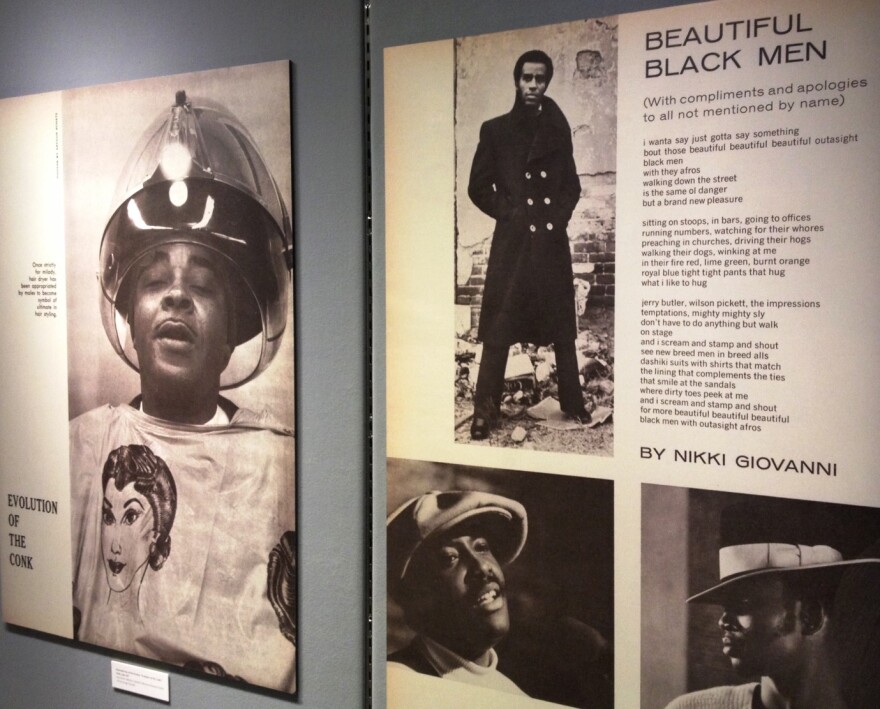An exhibit of rare materials put together by the Syracuse University libraries is likely to shed a different light on the various utopian visions of Black American life. The collection in part commemorates the 50th anniversary of the publication of the Autobiography of Malcolm X.
Power, race, and religion. Beauty, radicalism, and freedom. Those are just some of the lenses of utopian visions expressed in various writings and seen through photos and artifacts in the exhibit. Co-curator and Associate Professor of African American studies Dr. Joan Bryant says there isn’t just one message.
"We do want people to be aware of the diversity of opinion, and the varied visions not just across time, but among black people. We clearly want to complicate the idea of utopia because we have very varied images of utopia here, even within a single time period."
One example can be seen in an item from the scrapbook of Phillippa Schuyler. Interim Senior Director for the S.U. Libraries Special Collections Research Center Dr. Lucy Mulroney says Phillippa was the daughter of black intellectual author and critic George Schuyler.

"You can see that she's cut out a page from a newspaper clipping, which is about how Josephine and George are raising their child. It says, 'I shall teach my daughter there is but one race, the human race, says white Texas wife of George S. Schuyler.' Phillippa Schuyler was an an incredibly accomplished person at a very young age; she was a concert pianist, she was a journalist, and she did all sorts of wonderful things. We included this because it not only defies racial categories, but thinking about your children as a utopian enterprise."
Around the time George Schuyler had come to disdain socialism and embrace more conservative views, the Communist Party presidential ticket of 1932, 1936, and 1940 was on the ballot. Mulroney says they have a portrait of Earl Browder and running mate James Ford, who challenged Franklin Roosevelt.
"One of their mottos for the campaign was 'Communism is 20th century Americanism.' So, thinking about what 20th century America is, and that would be a communist party-led government with an African American Vice President. I think that is radical."

Especially in the era of Jim Crow. There’s also a letterhead in the exhibit from the committee of professional groups in support of the Browder-Ford campaign, and it includes the names of well-known people like Langston Hughes and Harry Gottlieb.
But the exhibit also explores what Professor Joan Bryant says was the utopian vision of blackness as beautiful…despite society’s assertions at the time. She says the changing views can be seen in ads ranging from skin lightening cream to the natural afro wig. That disparity is also illustrated by the changing hair treatments.
"This is something that Malcolm X describes in his autobiography, getting his hair conked, straightened, and talks about it as a sign of his own lack of self-worth. We see this being celebrated in a magazine for black men 'evolution of the conk,' and contrast that with the 1970's Nikki Giovanni poem about beautiful black men. No conks here."

Malcolm X figures heavily into the exhibit…there’s an entire case devoted to the his autiobiography released in 1965. The 50th anniversary of its publication hold special significance to S.U. The library's special collections research center is home to the records of Grove Press, the avante-garde publisher that hailed the book as one of its most important. The exhibit also features a handwritten letter Malcolm X sent to Alex Haley during his pilgrimage to Mecca.
The exhibit is on display now through mid-April on the sixth floor of S.U.'s Bird library. An opening reception for "Black Utopias" will be held this Thursday, October 15th from 5 to 7 p-m.




